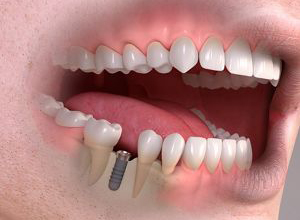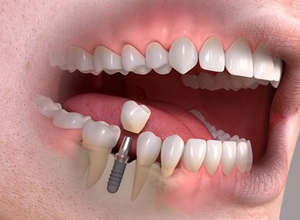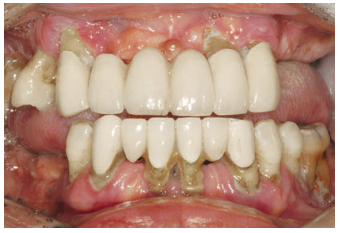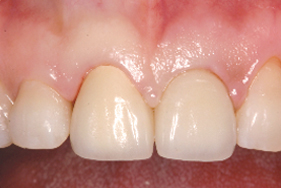260-262 Crawley Green Road
Luton, Bedfordshire LU2 0SJ
Implants are an exciting development for those patients who do not want dentures or bridges. They offer a natural-looking, realistic option and can be used to replace individual missing teeth. Implants are a very specialised, labour intensive dental treatment which can only be carried out by skilled, qualified practitioners hence the relatively high costs involved. However, once in place an implant functions entirely like a natural tooth and will last for life.
The implant itself is a small titanium screw which is gently placed in the jawbone to create a permanent new root. A tooth coloured crown is then placed over the implant to create a natural-looking tooth which needs no further specialist care. Unlike bridges, work does not need to be carried out on any other surrounding teeth making implants the ideal option for individual missing teeth.
The treatment is carried out in two stages; the first involves the placing of the implant which is then left for a period of time to heal and fuse with the bone. Once this has happened the tooth can then be reconstructed.
For more information about Dental Implants in Luton and to see how we can help you, book your Initial Consultation today on 01582 432181 or click here.

Have you lost all or some of your natural teeth? Bridges, dentures and flexible dentures are not the only solution, thanks to advances in modern dentistry. Have you heard of dental implants? Implant dentistry offers a clinically proven and safe solution to getting a great smile back and being able to bite and chew with confidence. This is how they work:



* For full-arch restorations, different treatment concepts are available. Please consult your dentist for more information.
X-ray images and CT scans are taken by dentists. After gathering the information, the possible treatment options are accessed. The advantages and disadvantages of the various solutions are openly discussed so that you are well-informed on every aspect of the procedure before making a decision.
Sufficient bone: an essential prerequisite. Sufficient bone must be present in order for implantation to go ahead. There are patients who have insufficient bone and require augmentation, for example if a tooth has been missing for a long time and the jaw has already receded.

The dental implant is surgically inserted under local anesthesia. A temporary restoration may be placed on the implant at time of surgery for the healing stage.

The healing phase usually lasts between a couple of weeks and a few months. During this period, ideally, the bone around the implant grows and integrates with the implant surface – a process called osseointegration. Good oral hygiene is vital in the healing stage of the treatment. Once healed, this artificial root acts as a base for fixing individual crowns, multi-tooth bridges, or an entire dental prosthesis.

The dental laboratory uses an impression of the implant site to produce the crown, bridge or denture. The dentist will place the restoration after the dental implant has healed.
Implants are an excellent option and investment in your health. With the right aftercare, they can last for a lifetime. For such a long-term success, taking care of your implant is important. As with natural teeth, implants require the same regular check-ups and conscientious oral hygiene. Once you follow these guidelines, your implants can be maintained for decades.
Even the best prosthesis will always be a foreign part that requires extensive care. By contrast, a dental implant is simply an artificial root, which on healing, merges with the body and acts likes a natural one.

Implants transmit chewing forces to the jaw bone. This is not the case if teeth are missing or when a conventional prosthesis has been put in place. If these forces cease, the bone may slowly recede and the shape of the face may change over time.

Functionality and visual appearance go together: an implant-borne restoration looks like a natural tooth – there is simply no visible difference, and special care is not required.

With dental implants, palatal plates required with conventional dentures are not necessary. You will feel more comfortable talking, smiling and eating.
With a conventional bridge, the healthy neighboring teeth to the right and left of the missing tooth have to be ground down to support the bridge. When using an implant to close the gap, the neighboring teeth are not affected and the natural tooth substance remains intact.

1. The upper and lower teeth do not bite down comfortably

2. Teeth drift closing the space that creates gaps

3. Food debris gets trapped in gaps, plaque builds up quickly. In extreme cases this can lead to gum disease and tooth decay

4. Resorption of jaw bone when left untreated for a prolonged period of time. This leads to difficulty wearing a denture

5. Loosing jaw bone will result in premature ageing by the lips and cheeks collapsing


Made from titanium they are placed by the dentist in the gap to secure a replacement tooth or bridge. The treatment can be for a single tooth or multiple teeth. Implants are also placed to secure an exisiting full denture.
Dental implants provide a more natural option for replacing missing teeth than false teeth or a bridge.

Implants are considered semi-permanent, although thorough regular check-ups and post-treatment care will guarantee a long implant lifespan.

Before

After

Before

After

Before

After

Before

After
Talk, smile and chew food with ease and comfort without worrying about how you look
Unlike conventional bridged tooth replacement your adjacent teeth are untouched
Implants function like natural teeth allowing you to chew food with ease and digest your food well
Loose fitting dentures can be uncomfortable. Experience a securely fitting denture with implants
When a tooth is removed bone is lost. Placing of dental implants preserves bone. Severe bone loss causes premature ageing
Implants are a long term treatment which can last a life time with regular check-ups and good health

1. a confident & natural smile

2. no more worries about tooth decay

3. the same chewing ability as natural teeth

4. a motivation to maintain good oral hygiene

5. a significantly improved eating experience

6. preserved natural adjacent teeth

7. cost effective, life long treatment

8. a securely fitting denture

9. a healthier, happier you!







Please email us at [email protected] or use the online form below. Fields with (*) are required.
Please contact us via this website or email without disclosing confidential information.